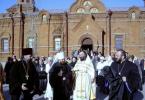Each person is not free from making sins. All people are sinful creatures, the difference is only in the number of forbidden actions committed and in their severity. Making a sin, a person is distinguished from the true path and may even send the anger of the Most High. In a similar situation best tool In the hands of a believer capable of erase his pritvenution, it serves repentance (Tauba).
Kranny Ayat says:
"Tell me my slaves, which were overwhelmed by themselves:" Do not despair in the grace of Allah. Truly, Allah forgives all sins, for he is forgiving, merciful "" (39:53)
The procedure, how to make repentance is described in the Hadith of the mercy of the worlds Muhammad (S.G.V.): "If the believer, having sin, is cleared, then makes and asks the Lord forgiveness, then Allah will certainly forgive him" (AT-Tirmisi).
That is, after a person sins, he should first make a bluntness, further - to read Taba-Namaz, the procedure for which the procedure is no different from other magazines, and at the end to ask for a forgiveness of forgiveness.
However, in order for repentance to be perfect, the believer should comply with a number of conditions:
1. Sincere repentance in the deed
First of all, the believer should clearly realize exactly what he made a mistake and sincerely repent of a perfect sin. In his revelation, the Creator says:
"After all, Allah forgives those who make evil by stupidity, frivolism and ignorance, but soon repent of this and ask him for forgiveness" (4:17)
2. Refusal to repeat this sin
A person who was aware of the fear of a certain act should refuse to repetition in the future. This is an instruction in the Quran:
"For those who, by making a bad act or a small sin, remembered Allah the Great, his punishment and a reward, his mercy and anger, repent, asked for forgiveness from Allah - and who, besides Allah, forgives sins? - And they did not persist in the fact that they were committed, knowing their sins, they will be forgiven from the Lord and the paradise gardens ... "(3: 135-136)
3. Failure to disclose your misconduct to other people
The person who committed a sin should not tell about him to other people. Messenger of the Lord (S.G.V.) instructed: "The creator will forgive and heament of all Muslims, with the exception of those who publicly exposed themselves, extending their sins, while the Most High hid them from the sight of others" (Hadith leads Bukhari and Muslim).
4. Sincere faith in the forgiveness of the Almighty
Another important condition - the slave of Allah should be believed to expect the mercy of his creator with all his heart. The Prophet Muhammad (S.G.V.) was spoken about this: "If a person commits sin and says:" Oh my Lord! I made a sin, forgive me, "the Creator answers:" My slave knows that he has the Lord who forgives sins and destroys them. Truly, I forgave my servant "(Bukhari, Muslim).
5. Multiple petition for the forgiveness of sins
Believers are advisable to regularly appeal to his Lord with a request to forgive them for the misdeed. In the Hadith, which is given from Ibn Umar, it is said: "According to our calculations, during one meeting (with people), the Messenger of the Most High (S.G.V.) is usually photocreked (pronounced words): "My Lord, forgive me and accept my repentance, truly, you are an accepting repentance, merciful! (Rabbi-Igfirli UA Tuba 'Alya-ya, Inna-Kya Antat-Tau-Uaburg Rakhim!) »(Tirmizi, Abu Daud, Ibn Maja).
6. Patience
Also, she should not remember that patience always serves as a key to success. Here you can bring such a Hadith: "Each of you will be answered, unless he will rush (events) and say:" I turned with a prayer (to the Lord of Worlds), but did not receive an answer! "" (Bukhari).
7. You can not tighten with repentance
After making a forbidden act, believers should not postpone the procedure of Tababa, since we do not know what can come tomorrow. (S.G.V.) warned: "Truly, the Almighty takes repentance of the slave until he starts to make death wheezing" (Hadith leads Tirmizi, Ibn Maja, Ahmad).
Advantages of repentance
- The Lord is rejoicing repentance.The Prophet (S.G.V.) instructed: "Truly, Allah rejoices repentance of his slave, which appeals to him with repentance" (Muslim).
- Tauba erases sins.On this account there is a reliable Hadith: "Running in sin is similar to someone who has not sinned" (Ibn Maja).
- The creator does not punish his slaves who repent.The Holy Scripture says:
"Allah will not expose their torment while they are praying for forgiveness" (8:33)
- For repentable angels do Dua.In the book of Allah, the words of the angels addressed to him are:
"Forgive those who repented and followed by your own way, and protect them from torment in hell. Our Lord! Enter them in the Gardens of Eden "(40: 7-8)
- Comer - the best of people.Final God's Messenger (S.G.V.) instructed: "All people make mistakes, and the best among the mistakes are coming by" (Hadith from Tirmisi and Ibn Maji).
Everything can be corrected!
1. You have sinned, wines before the Most High gives you peace, you do not know what to do, how to live next?
First, do not fall into emotions, we will take the situation intelligently. Allah Most High created human nature imperfect, we can not make sins, this is our integral part. In Hadith, it is said: "I swear by Allah, thanks to the power and will of which I live! If you did not make sins, Allah the Almighty would replace you with another people who would commit sins, and then asked for forgiveness from Allah. And Allah would forgave them (thus, it manifests that Allah is forgiving). "
The very first thing you need to do after committing sin is to accept and realize your sin. Many people make forbidden, without even suspecting that they do something wrong. The awareness of your sin is already a sign of faith in your soul, inappropriate with the heart of what is unpleasant to the Most High. If you close your eyes to your sins, they will follow one after another that a person will simply stop distinguishing good from the bad. You committed sin, but do not despair! Allah's grace is so limitless that everything can be fixed! Allah bestowed the keys to his forgiveness. Now you need to "work on errors" and fix everything.
2. Do not tell anyone about your sin Allah hides our sins by their grace, they remain only between us and the Almighty. And in this good. Your sin is what you must solve among yourself and Allah. There are no intermediaries between the Most High and Man, and there is no point in the disclosure of their sins. The Prophet (peace and blessing of Allah) taught: "All members of my community will be delighted, except for those who declare themselves about their sins. Such people refers a man who sinned at night, but the Almighty Allah covered his sin, and in the morning he himself says: "Oh so! I committed such a sin. " And it turns out that he spends the night under the cover of his Lord, and the Pokrov Allah dumps the morning. "
3. Realize the fear of your sin just think about all that you have deprived you of the minute weakness, your impulse, your NPS, your error. Recalculate everything you lost because of your sin. The most important thing is that you have done what Allah Almighty is dissatisfied. Sins deprive us of the lot, reduce food, remove from Allah, his grace. In addition, one sin entails another. Considering all this, raise all the soul, the act that deprived you of so many products and complicated your position.
4. Stop performing this sin The most important "practical" work on its mistake is to stop doing what removes you from the content of Allah. After all, it makes no sense in repentance, nothing else, while a person never ceases to make what is not good. In the Hadiths it is said: "We can assume that one who says says:" I apologize to Allah, "and then returns (to what he did)." "Razing in sin is similar to the one who did not commit him at all, but asking for forgiveness for sin, but continuing to sin, like a mocking over Allah."
5. Do not despair in the grace of Allah. Your mistake is your sin is not a reason for despondency, and despair, especially in the grace of Allah, it is a reason to become even closer to the creator. After all, if a person walks constantly condemning and winning himself, he will not see the meaning in life and will be ungregated Allah. This is a completely wrong position. Sins must be upset and upset us, but should not force their hands, but on the contrary - to wake a greater enthusiasm in the desire to gain the content of Allah. We are the believers characterizing how we treat our sin, and how we cope. Even in the very bad it is important to find a good, and in this case it is an opportunity to find the forgiveness of Allah, and to extract the lesson for the rest of your life.
6. Dua for forgiveness do ablution and say dua for forgivenessThe forms of which are a lot. Such can be: Subhanaka-llakhumma Wabihamdika, Ashkhad An La Ilyaha Illya Anta, Astagtiruk Ua Atuba Ilyaik ("Satory You, about Allah, and praise you! I testify that there is no deity worthy worship except you, I ask you about forgiveness and I offer You have your own repentance. " Allahumma J'alni Mina-Thauuabab Uadzh'alni Minal Mutatakhirin ("About Allah! Make me among ourselves and make me among the cleansing"). Ask Allah about forgiveness in any language, at any time and place, loud or about myself. Allah - hearing and knowing. "Allah Most High says:" About the son of Adam, truly, I will forgive you, not paying attention to what sins you committed, until you stop writing to me and hope for me! About the son of Adam, if you make so many sins that they have been achieved by clouds of heaven, and then ask me for a petition, then I will forgive you! ".
7. Make repentance the most important stage in the context of the commission of sins is sincere repentance and repentance. The righteouss said: "True repentance is to utter words of repentance by the language, repentance in the heart and determination never to return to sin. If a person is shown in this way, Allah will forgive his sin, even if he was big. Because Allah forgiving. " The Messenger of Allah (peace to him) said: "Every son Adam makes sins, but the best of them is the one who commits repentance." In the hadis of the Prophet Muhammad (peace and him) says: "The one who comes from the sincere repentance in his sins, as if he did not commit them." Repentance is a great blessing, and the joy, given by believers, which even after making a forbidden, during repentance can become absolutely clean.
8. Ask for forgiveness from offended if your sin is associated with the fact that the pain caused, insulted or humiliated another person, it is very important to ask for forgiveness from him. Our religion is amazing, she calls for peace and good, she does not tolerate disagreement, she is consent and calm. Also in this case, the offender needs to be forgiven from offended, and offended must forgive him. So, Islam's prescriptions establish order. This becomes clear from the Hadiths: "Let the one who acted unfairly towards his brother, with respect to his honor or anything else, will free from this today before the dinars and Dirhama disappear! After all, if he has good matters, they will be taken from him (on the day of the day) in accordance with the invasion caused by him, and if he does not have good deeds, something from the bad deeds offended and is entrusted to him. " "Forgiveness of man who made you Zulm, that is, the oppression." "Head to forgive and make concessions. For forgiveness and condescension only add greatness and significance to a person. And if you wish Allah to exalt you, forgive you and you are different to their sins. "
9. Make a good after sin "Truly, the owner of the left scroll (Angel writing bad things) keeps his feather raised over the scribbled Muslim slave for six hours. If he repented and asked for forgiveness from Allah (for the perfect sin), he (Angel) throws this sin. Otherwise, he writes it as one bad act. " 10. Make Tababa Namaz - this is a namaz repentance "If a person commits sin, it stands up for cleansing himself, then makes Namaz and then asks for Allah forgiveness, it can not be so that Allah will not forgive him." Performed in the number of two cancer.
Ibn Hajaru asked the question for which [others] gave two different answers.
The question was:
"Is it possible to do the DUA that all sins say goodbye to men and women and that they are freed from hell? And the first answer is: "Not permitted." Imam Ibn Abdussalem and Imam Al-Kurafi (Malikita) responded that it was not allowed to do such a dua, because we are so contrary to Allah and the Hadiths of his envoy, and bless him Allah and welcomes that among them (believers) are those Who will enter hell.
As for the plea for the forgiveness of sins in the words of the Most High Allah in the story about the prophet Nukh, peace is:
{رب اغفر لي ولوالدي ولمن دخل بيتي مؤمنا وللمؤمنين والمؤمنات}
Meaning: "O Lord, forgive our sins, my parents and those who enter my house, believing, as well as believing men and women," and similar, she came in the form of the verb during the Dua and does not matter a generalization, Because the verbs stand in an indefinite form and may mean, for example, all believers of that time.
Others responded: it is allowed to do such a DUA for several reasons. The first: Imami, will be pleased with them Allah, they said that Khatyuba is preferably (Sunna) to do Doua to believers and women. The second reason: Imam al-Mustagfiri handed over from Abu Khruire, and he - from the Prophet, and bless him Allah and welcomes:
ما من دعاء أحب إلى الله من قول العبد اللهم اغفر لأمة محمد رحمة عامة
« There is no dua, more beloved for Allah than the words of the slave: "Oh my Allah, forgive the sins of Umma Muhammad in common mercy"».
So written in Al-Udhal and in other famous books. The third reason: Sheikha Sharafuddina Al-Burmavi was asked whether it was possible to ask for the forgiveness of all sins and that [believers] were not placed for interrogation? And he replied: "I can ask Allah about forgiveness of all sins. Truly, Allah can be pleased with those people who deserves it, and to free it from debts before Allah and people. As for the Dua not to be placed for interrogation (i.e., in the area of \u200b\u200bArassat for the report), then this is a request for the impossible and cannot be asked about it. On the contrary, you should ask Allah to make it easier for it [Holds] in this place. "
Which of these opinions is correct? "
Sheikh Ibn Hadzhar al-Highty, and Allah's humble over him, replied:
Truly, to do the Dua to release all believers from hell, it is forbidden, moreover, it is a kufr, because it puts the sacred texts with a lie, pointing to the fact that some of the believer sinners will definitely enter hell. As for the plea for the forgiveness of all sins, if a person implies this request to free all believers from hell, then we have already told Hokm. If it means for the forgiveness, from which sins should be alleviated by one and the forgiveness of sins to others, or simply made such a dua, without any intention, then there is nothing forbidden. If you ask why it is possible with the above intention, it is so clear. As for the permitting of such a Dua without any intention, then [this is permitted,] because of such a Dua should not be completely cleansing from sins, since such a DUA is used both in this sense and in the sense of sins. Moreover, if a person does Dua: "About my Allah, forgive all the sins to all believers," and will make the intention that he asks for forgiveness to sins one and ease to others, then it is permitted. But if the intention is that no one impurge into hell, then such a DUA cannot be done.
If a person tells in Dua: "Forgive all the sins of Muslims," \u200b\u200band will do it without any intention or with the intention to free all from hell, it is a haram. If this he wanted to someone alleviated [the severity of sins], then it is possible. The difference between these two examples is clear from the above.
Truly, Allah commanded his prophet Muhammad asking for forgiveness for believers men and women:
{واستغفر لذنبك }
Meaning: " Ask for the forgiveness of your sin"(Sura" Gafir ", Ayat 55), -
as well as:
{وللمؤمنين والمؤمنات}
«… and believing men and women"(Sura" Nuh ", Ayat 28).
Therefore, it is necessary to take the words of Ibn Abdussalem and his student al-Kuraffe to what I explained.
So, we learned: the generalization of the first responsible is in the ban, and the answer is the second - in the permitting, and this is wrong. And the fact that the second led as the argument of the Hadith from al-Mustagfiri is also wrong, because the common mercy does not mean the forgiveness of all sins in the sense of purification from all of them. Truly, from Ibn Masuda, may be pleased with both Allah, transferred:
» إن لله رحمة على أهل النار فيها «
« Truly, the mercy of the Most High Allah is over the inhabitants of hell in hell"," Because Allah could punish them even stronger than they are punished. " Also the Most High Allah said:
{وما أرسلناك إلا رحمة للعالمين}
« We did not send you except grace for worlds"(Sura Al-Anbia, Ayat 107). Consequently, in the message of the Prophet, may Allah bless him and welcomes, there is mercy and for his enemies, namely, they are not punished immediately. Allah, he hires and is great, knows better.
(From the book Al-Fatava al-Hadicia (p. 86-88). Damascus: Dar AT-Takva, 2008).




